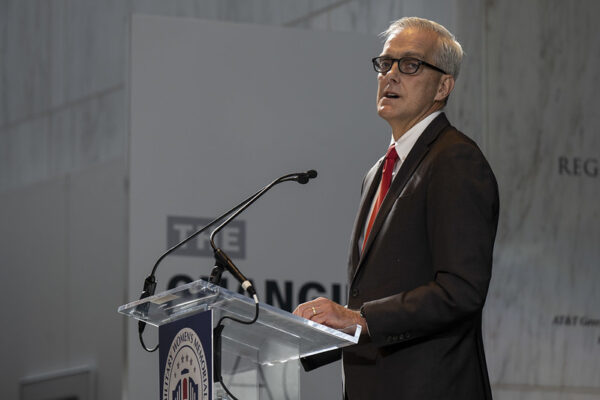
VA Secretary Denis McDonough stated in March that he was not worried about the House Republicans’ budget bill taking away VA funding. However, the VA issued a press release criticizing the newly announced GOP-authored bill on Friday. (Photo: Petty Officer 2nd Class Alexander Kubitza, DoD)
Update: Republicans’ budget proposal has passed in the House. It now goes to the Senate where it is expected to face stiff opposition.
On April 21, the U.S. VA published a release criticizing the GOP-backed Limit, Save, Grow Act of 2023 lauded by Speaker Kevin McCarthy (R-Calif.), alleging the proposal would cut the department’s overall budget by an estimated 22 percent.
The budget proposal does not specifically mention slashing the VA’s funding; however, the bill would place a cap on federal spending to be determined by the Appropriations Committee, with both the VA and House Democrats believing the effects on the VA would be significant and widespread.
Among the potential effects of the bill, the VA says it would be forced to cut up to 81,000 Veterans Health Administration jobs, leading to as many as “30 million fewer Veteran outpatient visits, particularly in rural areas,” and drastically longer wait times for medical care. Expansions to telehealth services and the construction or renovation of VA health care facilities across the country would either be halted or diminished.
Additionally, VA services not related to health care would be affected. The VA’s National Cemetery Administration would potentially be forced to cut up to 500 jobs centered on maintenance and “delay the opening of five new national cemeteries that will serve nearly 1.6 million Veterans and eligible family members.” The VA also says Housing Choice Vouchers for as many as 50,000 Veterans would be cut.
Finally, the VA notes that other federal departments would likely see their Veterans services impacted. SNAP, which provides food assistance to over 1.3 million Veterans, would likely see cuts — though, the VA neglected to provide an estimate. The Department of Labor’s Homeless Veterans’ Reintegration Program would be forced to slash transitional and educational services for up to 4,200 homeless and at-risk Veterans. And the Department of Health and Human Services, would likely cut Veterans mental health and substance abuse programs.
House Committee on Veterans’ Affairs Chairman Mike Bost (R-Ill.) issued a response to the VA’s critique soon after, noting:
“For months, Democrats have spread false claims that House Republicans would cut veterans’ benefits to get our fiscal house in order. With the introduction of the Limit, Save, Grow Act, the message could not be clearer. This commonsense bill will grow the economy and save American taxpayers money, all while protecting Veterans’ benefits, Social Security, and Medicare. Republicans have always prioritized Veterans in our spending to ensure Veterans have access to the care, benefits, and services they have earned, and as the Chairman of this Committee, that is my number one priority. Anyone who questions our commitment to the men and women who have served should find new talking points.”
In an op-ed published by Military Times, Reps. Mark A. Takano (D-Calif.), Debbie Wasserman Schultz (D-Fla.), and Chris Deluzio (D-Pa.) said:
“Last Congress, we honored our promise to toxic-exposed Veterans by providing benefits and care to approximately three million Veterans exposed to toxins, including burn pits. However, this achievement is meaningless if the funding to implement it is gutted. Republicans have promised to reduce funding to fiscal year 2022 levels — which risks a 22% decrease in resources for Veterans’ care and benefits. And many of them are calling for even deeper cuts.”
A vote for the Limit, Save, Grow Act is scheduled for Tuesday afternoon. The bill is expected to pass in the House but faces severe opposition in the Senate. The bill’s entire text, as it exists now, can be found here.












